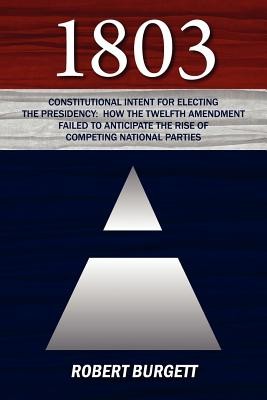
- We will send in 10–14 business days.
- Author: Robert Burgett
- Publisher: Outskirts Press
- Year: 2012
- Pages: 206
- ISBN-10: 1432785877
- ISBN-13: 9781432785871
- Format: 15.2 x 22.9 x 1.1 cm, softcover
- Language: English
- SAVE -10% with code: EXTRA
Reviews
Description
The goal of historians should be to eliminate any personal biases relying solely on facts to capture the most accurate portrayal of a time - to start with facts and allow a thesis to mature naturally, not vice-versa. The passing of the twelfth amendment to the United States Constitution is one of those occurrences where scholars have failed to do their homework. I have yet to find a single source that quotes any one of the many congressmen engaged in drafting the twelfth amendment; the U.S. Code, in 2010, referenced just one article pertaining to the twelfth amendment, Thomas Jefferson Counts himself into the Presidency, 2004. I found that the current understanding of twelfth amendment origins is in great disharmony with historical facts. This has left many without a clear understanding of the issue. This paper challenges the currently accepted view that Article II of the United States Constitution failed to account for a rise of competing national parties. I contend that the twelfth amendment passed Congress in order to prevent the rise of competing national parties. This paper answers the question: "Which electoral method, Article II or the twelfth amendment, accounts for a rise of competing national parties?" To bring the reader into a time where states are not yet united, I use a hypothetical 2012 North-South American Union to put the issue in its proper perspective. I use, as proofs, electoral results and statements of belief from prominent statesmen like Washington, Jefferson, and Adams; constitutional drafters - Madison, John Rutledge, Charles Pinckney, Robert Yates, Edmond Randolph, Oliver Ellsworth, Morris, and Peirce Butler; congressmen like Abraham Baldwin, George Thatcher, John Smilie, John Randolph, Robert Waln, Robert Harper, Harrison Gray Otis, John Brown, Henry Lee, Michael Leib, William Hill; and those who debated the twelfth amendment - James Hillhouse, Uriah Tracy, William Plumer, Wilson C. Nicholas, John Q. Adams, John Taylor, Peirce Butler (a Drafter abovementioned), Samuel White, and Jonathon Dayton.
- Author: Robert Burgett
- Publisher: Outskirts Press
- Year: 2012
- Pages: 206
- ISBN-10: 1432785877
- ISBN-13: 9781432785871
- Format: 15.2 x 22.9 x 1.1 cm, softcover
- Language: English English
The goal of historians should be to eliminate any personal biases relying solely on facts to capture the most accurate portrayal of a time - to start with facts and allow a thesis to mature naturally, not vice-versa. The passing of the twelfth amendment to the United States Constitution is one of those occurrences where scholars have failed to do their homework. I have yet to find a single source that quotes any one of the many congressmen engaged in drafting the twelfth amendment; the U.S. Code, in 2010, referenced just one article pertaining to the twelfth amendment, Thomas Jefferson Counts himself into the Presidency, 2004. I found that the current understanding of twelfth amendment origins is in great disharmony with historical facts. This has left many without a clear understanding of the issue. This paper challenges the currently accepted view that Article II of the United States Constitution failed to account for a rise of competing national parties. I contend that the twelfth amendment passed Congress in order to prevent the rise of competing national parties. This paper answers the question: "Which electoral method, Article II or the twelfth amendment, accounts for a rise of competing national parties?" To bring the reader into a time where states are not yet united, I use a hypothetical 2012 North-South American Union to put the issue in its proper perspective. I use, as proofs, electoral results and statements of belief from prominent statesmen like Washington, Jefferson, and Adams; constitutional drafters - Madison, John Rutledge, Charles Pinckney, Robert Yates, Edmond Randolph, Oliver Ellsworth, Morris, and Peirce Butler; congressmen like Abraham Baldwin, George Thatcher, John Smilie, John Randolph, Robert Waln, Robert Harper, Harrison Gray Otis, John Brown, Henry Lee, Michael Leib, William Hill; and those who debated the twelfth amendment - James Hillhouse, Uriah Tracy, William Plumer, Wilson C. Nicholas, John Q. Adams, John Taylor, Peirce Butler (a Drafter abovementioned), Samuel White, and Jonathon Dayton.


Reviews